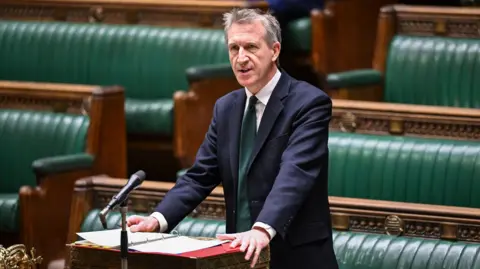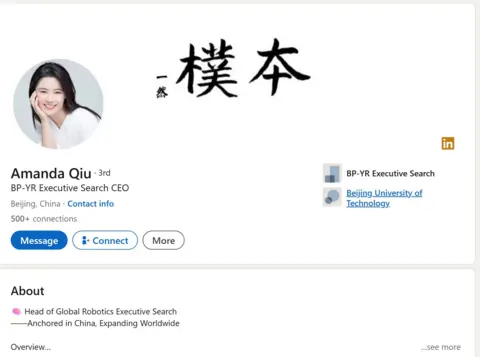Jennifer McKiernan,Political reporter,
Frank Gardner,Security correspondent and
Kate Whannel,Political reporter
 House of Commons
House of CommonsSecurity minister Dan Jarvis has said the government will not tolerate “covert and calculated” attempts to interfere with the UK’s sovereign affairs, after MI5 warned MPs of the risk from Chinese spies.
An alert issued to MPs, peers and parliamentary staff by security services identified two LinkedIn profiles, which it says are used on behalf of the Chinese Ministry of State Security (MSS).
It says they act as “civilian recruitment headhunters”, targeting individuals working in British politics to solicit “insider insights”.
A spokesperson for the Chinese embassy in the UK said accusations of espionage were “pure fabrication” and accused the UK of a “self-staged charade”.
“We strongly condemn such despicable moves of the UK side and have lodged stern representations with them,” the spokesperson said.
They urged the UK to “stop going further down the wrong path of undermining China-UK relations”.
Commons Speaker Sir Lindsay Hoyle and his counterpart in the House of Lords, Lord McFall, circulated the MI5 warning to MPs and peers on Tuesday.
The alert specifically identified two LinkedIn profiles set up with the names Amanda Qiu and Shirly Shen.
The BBC has contacted both for a response, although it is not clear if the women named and pictured on the networking site are the actual account holders.
Simon Whelband, a researcher for Conservative MP Neil O’Brien, told the BBC he had been contacted by one of the accounts.
After receiving the alert from Parliament, he searched his LinkedIn account and discovered a three-month-old message from a profile in the name of Shirly Shen.
The message, written in poor English, included a potential job offer.
Mr Whelband, who has reported the message to the parliamentary authorities, said he found the incident “deeply worrying”.
“It’s put me on edge a little bit, but I’m not surprised,” he said, noting that O’Brien, the MP he works for, is a vocal critic of China.
“I’ve worked around Parliament for about 10 years now so I’m kind of used to this.
“But if you were more junior, you don’t know what you’re looking for.
“You might think it’s a genuine offer that’s made to you on LinkedIn, they might accept.
“If it was written in better English and looked more credible you could be fooled into thinking it was genuine.”
 Simon Whelband
Simon WhelbandIn his letter to MPs, Sir Lindsay said both profiles were being used “to conduct outreach at scale” on behalf of the Chinese MSS.
He said Chinese state actors were “relentless” in trying to “interfere with our processes and influence activity at Parliament”.
He said the Chinese MSS was “actively reaching out to individuals in our community”, and that they wanted to “collect information and lay the groundwork for long-term relationships, using professional networking sites, recruitment agents and consultants acting on their behalf”.
Other elements of espionage described in the MI5 alert include all-expenses paid trips to China, and payment for information through cash or cryptocurrency.
Targets are said to include “Parliament staff, economists, think tank employees, geo-political consultants and those working alongside [the government] including MPs and members of the House of Lords”.
 LinkedIn
LinkedIn LinkedIn
LinkedInJarvis announced a package of measures in the House of Commons to tackle espionage threats to the UK.
These included £170m to upgrade encrypted technology for government business, as well as new protections against Chinese cybercrime and attempts to influence UK university research.
Jarvis told MPs: “Our intelligence agencies have warned that China is attempting to recruit and cultivate individuals with access to sensitive information about Parliament and the UK government.”
He added: “This activity involves a covert and calculated attempt by a foreign power to interfere with our sovereign affairs in favour of its own interests, and this government will not tolerate it.”
He warned China had a “low threshold” for what information is useful, as it attempts to build a wider picture.
Jarvis highlighted a pattern of behaviour around Chinese spying attempts, which he said he would take “all necessary measures” to protect against, including updating and strengthening national security powers.
He said rules will be tightened to tackle covert funding of political parties, while the Electoral Commission will be given greater enforcement powers.
There will also be security briefings for all parties and candidates standing in the elections next May for the Scottish Parliament, Welsh Senedd, and councils across England.
Stressing that China is still the UK’s third biggest trading partner, Jarvis said the UK would nevertheless use sanctions “as necessary”.
Conservative shadow Home Office minister Alicia Kearns urged the government to increase transparency of China’s activities in the UK by putting the country on the enhanced tier of the Foreign Influence Registration Scheme (FIRS).
Currently only Iran and Russia are in the enhanced tier, meaning someone cannot carry out work for the countries until they have registered their activity with the government.
Kearns also said the government should cancel planned visits to China and reject an application to build a Chinese embassy at a sensitive location in central London.
Jarvis said the government was “looking closely at whether it is necessary to make further additions onto the enhanced tier” for FIRS but added that “no decision has yet been made”.
On the embassy, he said the decision would be made by the housing secretary.
Former Conservative Party leader Sir Iain Duncan Smith said the alert showed China was taking an “aggressive position” that “blows a hole through all of that ridiculous nonsense” about whether or not China was a threat to UK national security.
“We have to be much, much more vigilant,” he told BBC News.
“Why is the government so unable to call China what it is, which is a persistent, continuing threat to Britain’s national security.
“That is clear to every single member of the public… but somehow the government seems to think it isn’t that clear.”
While it is accepted that all countries spy on each other, the scale of China’s activities has caused increasing concern in recent years.
Whitehall officials have warned of Chinese cyber attacks, intellectual property theft and attempts to recruit British individuals in Parliament and the technology sector.
In 2022, MI5 issued an “interference alert” about the activities of alleged Chinese agent Christina Lee, who was believed to have infiltrated Parliament. Ms Lee denied the allegations.
China is also believed to be gathering bulk data on the UK population including accessing data sets that contain financial, personal or health information.
Earlier this year, MI5 boss Ken McCallum warned that Chinese state actors posed a daily national security threat to the UK.
In September, a case involving two men accused of spying for China collapsed in controversial circumstances.
One of the men was a parliamentary researcher. Both men denied wrongdoing.
The head of the Crown Prosecution Service said the case collapsed because it could not get evidence from the government referring to China as a national security threat.
However, some legal experts have questioned whether the CPS would have needed this evidence to go ahead with the prosecution.





